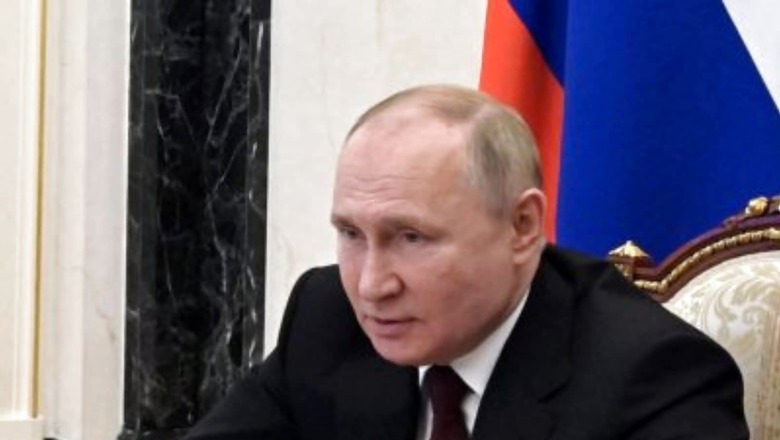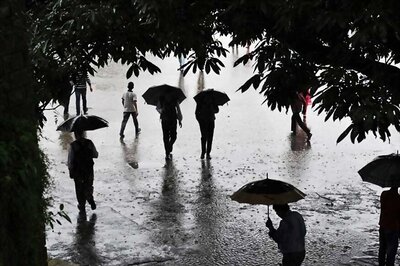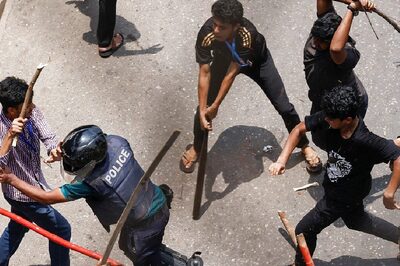
views
Vladimir Putin has been expecting the West.
Since 2014, when the United States and its Western allies imposed sanctions on Moscow following the annexation of Crimea and the downing of Malaysian Airlines Flight 17, Russia’s president has been trying to build an economy capable of withstanding much tougher penalties.
The West this week announced several rounds of sanctions after Russian troops invaded Ukraine. The penalties target the heart of the Russian financial system and will put the country’s “fortress economy” to the test.
The latest barrage came Saturday, when the United States, the European Union, the United Kingdom and Canada said they would expel some Russian banks from SWIFT, a global financial messaging service, and “paralyze” the assets of Russia’s central bank.
Fear of what sanctions might do sent Russian stocks crashing 33% on Thursday. They have since recovered some of those losses, but the ruble continues to trade near record lows against the dollar and the euro. Russian markets will likely come under renewed pressure when trading resumes Monday.
Russia’s $1.5 trillion economy is the world’s 11th biggest, just behind South Korea, according to World Bank data. Since 2014, its gross domestic product has barely grown and its people have gotten poorer. The value of the ruble has also tumbled, shrinking the value of the Russian economy by $800 billion.
Over the same period, Moscow has tried to wean its oil-dependent economy off the dollar, limited government spending and stockpiled foreign currencies.
Putin’s economic planners have sought to boost domestic production of certain goods by blocking equivalent products from abroad. Moscow has meanwhile amassed a war chest of $630 billion in international reserves — a huge sum compared to most other countries.
David Lubin, a Citi economist and associate fellow at Chatham House, said “fortress economics” requires the creation of big foreign currency reserves that can be spent if sanctions bite.
“Russia has followed this pattern assiduously,” he wrote recently.
Some of those reserves are already being deployed. The Russian central bank said Thursday it was intervening in the currency markets to prop up the ruble. And on Friday, it said it was increasing the supply of bills to ATMs to meet increased demand for cash. Russian state news agency TASS reported that several banks had seen increased withdrawals since the invasion of Ukraine, notably of foreign currency.
While building up a war chest, Putin’s austere strategy has also limited economic growth, investment and productivity, and prioritized state companies over private business. The incomes of ordinary Russians have regressed to levels last seen in the early 2010s, and new foreign direct investment is minimal. Russia has also failed to diversify away from oil and gas, leaving it heavily exposed to swings in global commodity prices.
Taking on the ‘fortress’
After Russian troops attacked Ukraine from the north, south and east, US President Joe Biden on Thursday unveiled sanctions designed to damage Russia’s economy and turn Putin into an international “pariah.”
The US penalties target Russia’s two largest financial institutions, Sberbank and VTB, and prevent them from processing payments through the US financial system. Russian state-owned companies will not be allowed to raise capital through US markets. The sanctions cover nearly 80% of banking assets in Russia.
The United States is also trying to hobble Russian military and industrial companies by preventing them from buying critical technology such as advanced computer chips.
The European Union, the United Kingdom, Japan, Australia and other countries announced sanctions of their own against Russian companies and individuals, coordinated action that is unprecedented in terms of its scope and potential economic impact. US, UK and EU officials went further on Friday and sanctioned Putin himself.
The West tightened the screw again on Saturday. The United States, the European Union, the United Kingdom and Canada said in a joint statement that they would remove some Russian banks from SWIFT, a high security messaging network that connects thousands of financial institutions around the world.
“We are engaging with European authorities to understand the details of the entities that will be subject to the new measures and we are preparing to comply upon legal instruction,” SWIFT, which is based in Belgium, said in a statement.
The Western coalition said it would also take steps to prevent Russia’s central bank from deploying its international reserves to shore up the ruble. Ursula von der Leyen, president of the European Commission, said in a statement that the measures would “paralyze the assets of Russia’s central bank.”
Saturday’s announcement came as Russian troops attacked cities across Ukraine and was thin on detail. The West did not say which Russian banks would be removed from SWIFT, nor how it would target the central bank.
But a senior Biden administration official told reporters the measures would show that “Russia’s supposed sanctions-proofing of its economy is a myth.”
“The $600 billion-plus war chest of Russia’s foreign reserves is only powerful if Putin can use it, and without being able to buy the ruble from Western financial institutions, for example, Putin’s central bank will lose the ability to offset the impact of our sanctions,” the official said.
The sanctions package is unprecedented in scale, even before the measures announced Saturday.
“I don’t think we have seen anything like this, and it’s much, much more severe than sanctions in 2014,” Iikka Korhonen, the head of the Bank of Finland Institute for Emerging Economies and an expert on Russia’s banking and financial systems, told CNN Business on Friday.
Still, Russia has been preparing its economy for this moment, and global oil prices of $100 per barrel are producing huge amounts of revenue for the state.
“They can manage for a while,” said Korhonen. “But the longer this lasts, it means the growth will be slower.”
Balancing act
Western countries have sought to punish Moscow for the invasion without doing major damage to their own economies. Natural gas prices are extremely high in Europe, and cutting off supplies from Russia could drive them higher. Reduced exports of Russian crude would similarly hike oil and gasoline prices.
SWIFT is seen as a particularly blunt instrument.
Removing Russia entirely from SWIFT would make it much harder for financial institutions to send money in or out of the country, delivering a sudden shock to Russian companies and their foreign customers — especially buyers of oil and gas exports denominated in US dollars.
But targeting only certain Russian banks could allow payments to be made in exchange for Russian oil and gas exports.
With Russian troops advancing on the capital Kyiv, some say the West should be willing to pay a steep economic price.
“We don’t have five years to slowly degrade the Russian economy. We need to do it now,” said Tyler Kustra, an assistant professor of politics and international relations at the University of Nottingham in England.
Read the Latest News and Breaking News here




















Comments
0 comment